Non-Dairy Milk Substitutes: Everything You Need to Know
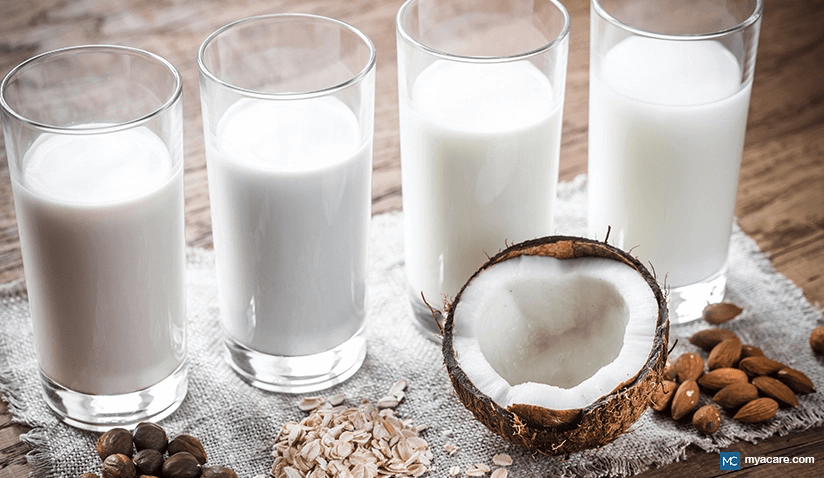
Medically Reviewed and Updated by Dr. Rosmy Barrios - October 03, 2024
Be it simply on its own, with cereal, or with tea or coffee, there are diverse ways to enjoy milk. Regardless of age or gender, it is apparently one of the most nutrient-dense staples.
However, with vegan diets on the rise, personal preferences, conditions such as lactose intolerance, allergies, and even dietary restrictions, many have stopped consuming dairy milk. Interestingly, there are more than enough alternatives to dairy milk that are equally nutritious and safe for consumption. This article discusses some of the popular non-dairy milk substitutes available at regular grocery stores and their nutritional characteristics. But first, let us compare the different kinds of milk - dairy and non-dairy.
Non-Dairy vs. Dairy Milk
Dairy milk, also known as animal-based milk, is produced from the mammary glands of domestic animals, of which cow is the most common. Other animals like sheep and goats also produce milk, but those milks are less popularly used. Besides being a good source of protein, dairy milk has most of the essential vitamins and minerals, making it a very nutritious drink. Dairy milk comes in whole, low-fat, and fat-free versions, also known as skimmed milk which can be processed in powder, condensed, or liquid form. According to Sources, when consumed, 1 cup of ordinary whole milk has 146 calories, 8 grams of protein, 13 grams of carbohydrates, and 8 grams of fat.
Non-dairy milk, on the other hand, is a plant-based milk obtained from blended nuts, grains, legumes, seeds, and even vegetables. Most types of organic non-dairy milk are not fortified with key nutrients that dairy milk contains naturally. Hence they mostly rely on artificial additives, which are not enough to support the body. With most non-dairy alternatives, you need to consume other food sources to compensate for missing nutrients.
Nine Non-Dairy Milk Substitutes
In this article, we will discuss nine of the many non-dairy options available today as dairy milk replacements.
Note: The nutritional values mentioned below are approximate figures and can vary based on the brand and factors such as added sweeteners or flavors.
Almond Milk
Almond milk is slightly sweet, with a light texture and a nutty flavor. It can be taken as a drink, added to coffee, tea, and smoothies, or even used for baking pastries. A cup of almond milk without additives has 2 grams of carbs, 1 gram of protein, 2.5 grams of fat, and up to 35 calories per cup. Is almond milk healthier than regular milk? Compared to whole milk, it has significantly lower calorie and fat content, which is why it is a preferred option for those on low-calorie diets while still getting all the nutrients their body needs. It is rich in vitamin E, an antioxidant your body needs to protect you from free radicals-induced damage that may endanger your health in different ways. This non-dairy milk is packed with healthy fat, fiber, and has a good mineral profile. Almond milk is also lactose-free, which makes it a nutritious option for individuals who are lactose-intolerant.
Oat Milk
This is a popular dairy-free substitute made from regular oats and water. However, oils, salt, and gums are added to improve taste and texture. A good alternative to cow's milk is oat milk, as it can be used for cooking and also taken with cereal, coffees, or added to smoothies. There are 2-3 grams of protein, 16 grams of carbohydrates, 5 grams of fat and about 120 calories in one cup of oat milk. Due to its similar nutritional profile to dairy milk, it is not ideal for weight loss. However, studies have shown it gives a feeling of satiety expected with the intake of oats, reducing overall food consumption. Besides being a great source of fiber, it lowers bad cholesterol (LDL) in the blood. This is why individuals predisposed to cardiovascular diseases are advised to make it the primary source of milk in their diets. It is affordable and can be made in the comfort of your home.
Coconut Milk
It is simply produced from water and the white inner flesh of brown coconuts. A cup of coconut milk has traces of carbohydrates, no protein, 4 grams of fat, and 45 calories. It has the lowest carbohydrate and protein content among other options besides its low-calorie content. Most people use it in several cooking and baking recipes. If you want to improve your protein intake, coconut milk is not a suitable option. On the other hand, it is your best bet to reduce your carb intake. Coconut milk has also been shown to have anti-diabetic, hypolipidemic, and renal protective properties. The drawback of this milk is that the majority of the fat is saturated, which, when ingested in excess, can cause a buildup of harmful cholesterol in the blood.
Rice Milk
White or brown rice processed with water produces rice milk. It is the safest among other non-dairy milk options as it does not contain soy, gluten, or nuts that most people are allergic to. Rice milk has a naturally sweet flavor. Most people enjoy having it alone, but it is also great in smoothies, desserts, and oatmeal. Rice milk has roughly 50 calories per cup, 38 grams of carbohydrates, 1 gram of protein, and 3 grams of fat. It is a rich source of carbohydrates, even higher than regular dairy milk, which is why it is typically unsuitable for people with diabetes, as it could increase their blood sugar levels. However, it is a great option for athletes and children who are physically active as they need additional energy sources. There are different types of rice milk; white, brown, and rice bran milk. The last one, surprisingly, is associated with a hypoglycemic effect. If rice forms one of your main meals, consuming other non-dairy milk options is recommended to diversify your diet and avoid being malnourished.
Cashew Milk
You probably did not know that one of your favorite nuts can be made into milk. Cashew milk is made from cashew nuts mixed with water. It is rich in taste with a creamy texture, and its distinct nutty flavor makes it a great additive to smoothies, coffee, and desserts. So, is cashew milk good for you? A cup of this milk contains approximately 50 calories, 2 grams of carbohydrates, 4 grams of fat, and a gram of protein. Its low protein content makes it unsuitable for people who require high-protein diets, but it works wonders for those who want to reduce their daily calorie intake and regulate their blood sugar levels. It is also a non-dairy substitute that is easy to prepare at home.
Soy Milk
As the most popular dairy-free milk nutritionally similar to dairy milk, soy milk is made from soaked soybeans. It also contains oils and thickeners that help make the taste and consistency better. Many use it as a creamer for coffee or take it with cereal, while some enjoy it alone due to its creamy, sweet flavor. A cup of unsweetened soymilk contains up to 90 calories, 4.5 grams of fat, 9 grams of protein, and 4 grams of carbohydrates. So it is one of the few plant-based sources that serve as a very rich source of protein and iron which makes it a great substitute for dairy milk, especially for those who are lactose intolerant.
Hazelnut Milk
This is produced the same way as almond milk but using hazelnuts. It is usually sweetened using a brown rice sweetener and caramel flavor. Hazelnut milk is a great source of dietary minerals such as potassium, calcium, and vitamins D and B2. Hazelnut milk has about 110 calories, 7 grams of carbohydrates, 3 grams of protein, and 11 grams of fat per cup. Due to the high sugar and fat content in hazelnut milk, diabetics and people trying to lose weight are advised against it. However, it is a good source of heart-healthy omega-3 fatty acids.
Banana Milk
This is made from bananas, which are naturally very sweet. It is a nut-free option for those with allergies. A cup of banana milk has about 60 calories, a gram of protein, 7 grams of carbs, and 3 grams of fat. Its distinct flavor makes it a great additive to make smoothies.
Tiger Nut Milk
This is a non-dairy substitute made from tiger nuts which are tubers, not nuts. Those who are allergic to nuts can consume this type of milk without any problems. It is usually made with rice milk to make it creamier. Many people enjoy having it alone or with a chia seed recipe. A cup of tiger nut milk contains about 70 calories, 6 grams of carbs, 1 gram of protein, and 4 grams of fat.
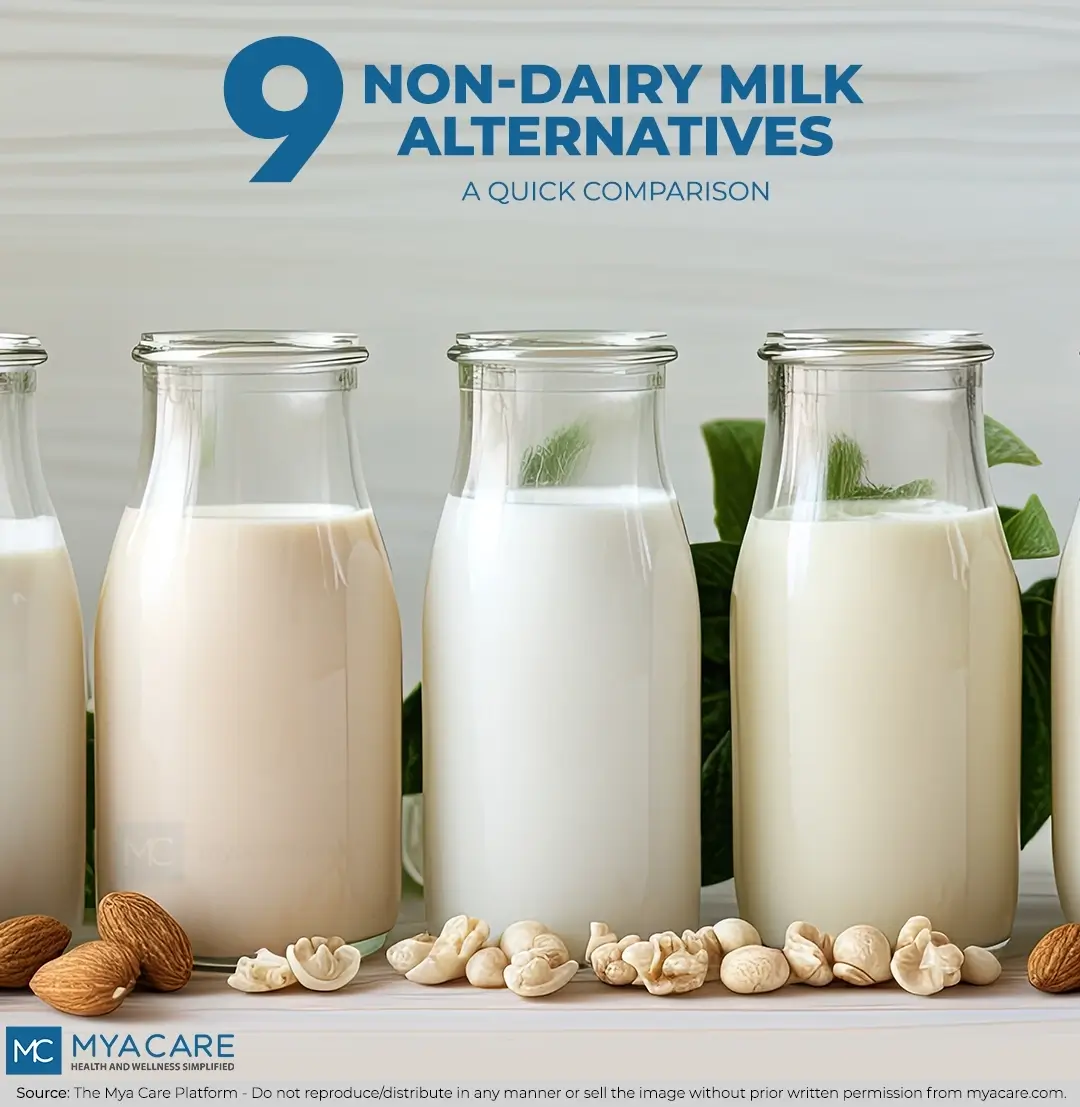
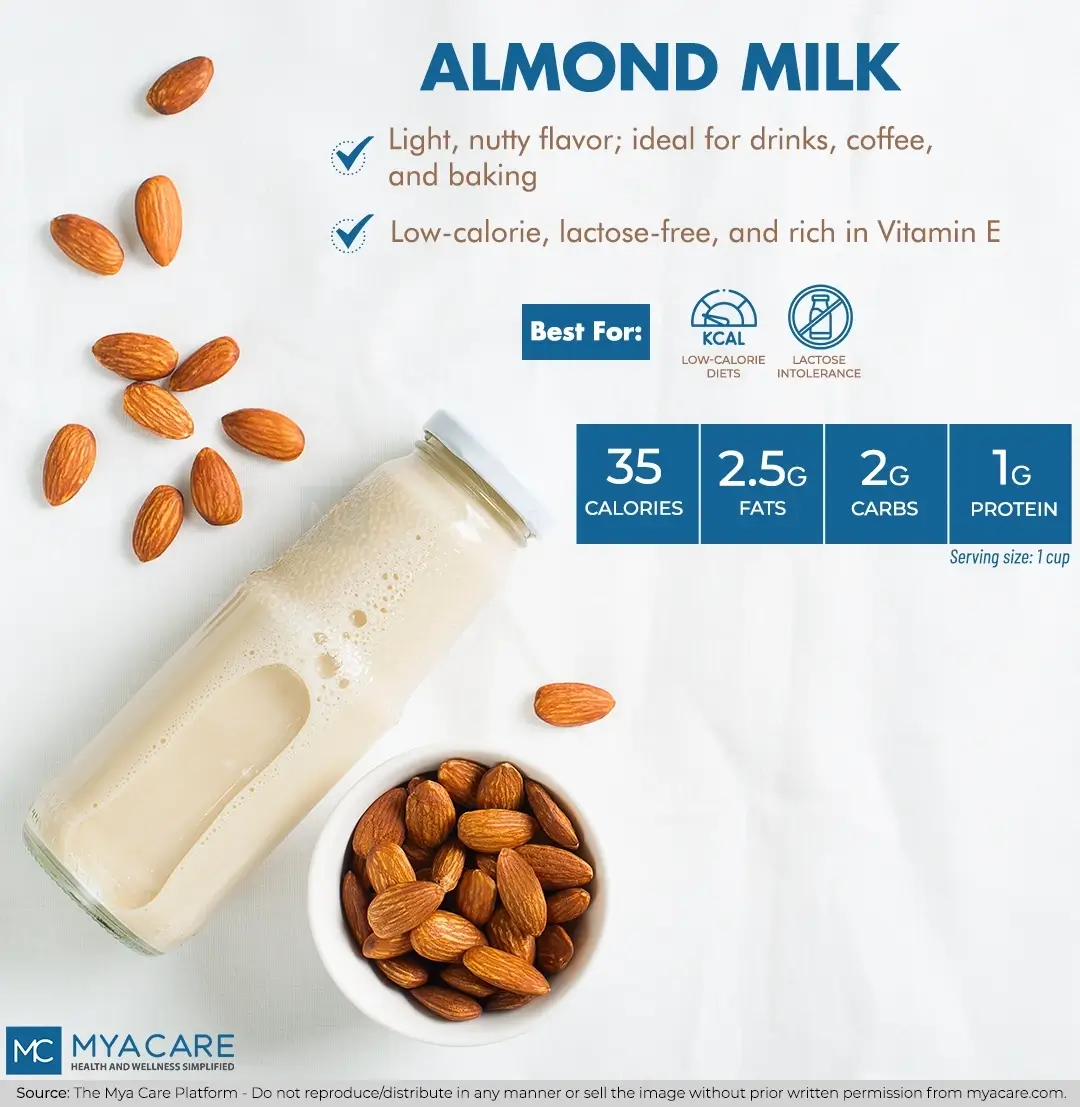
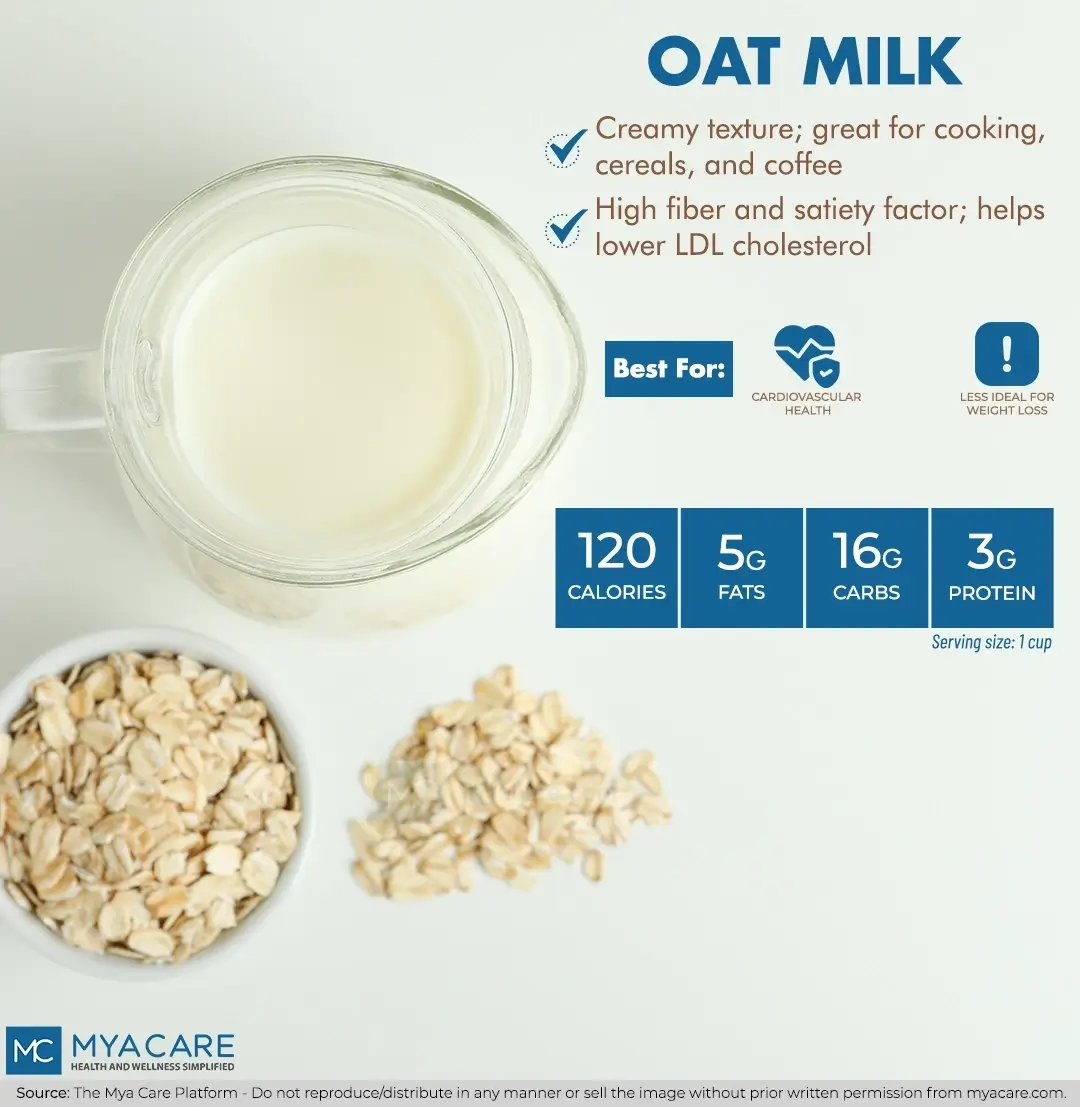
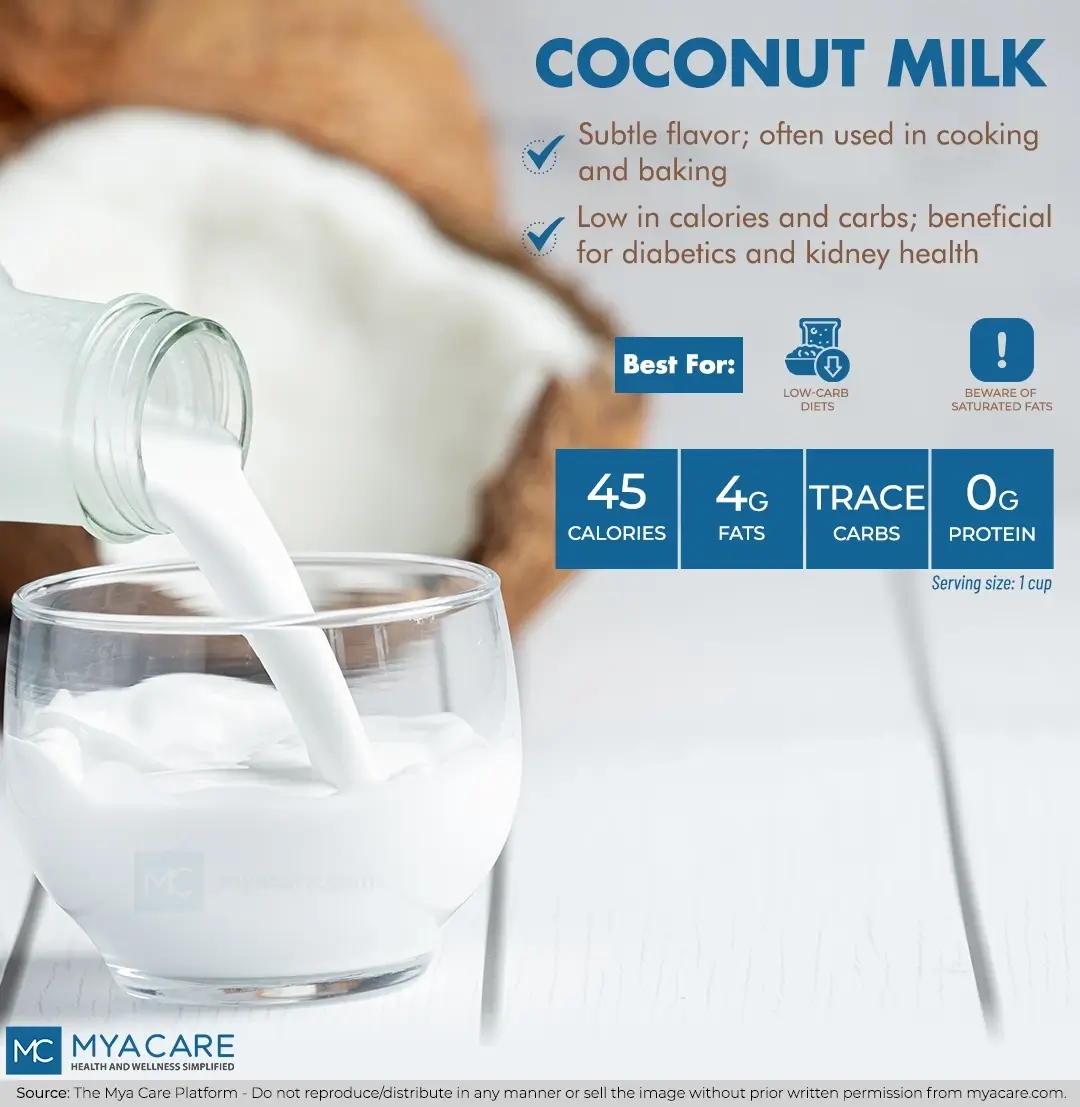
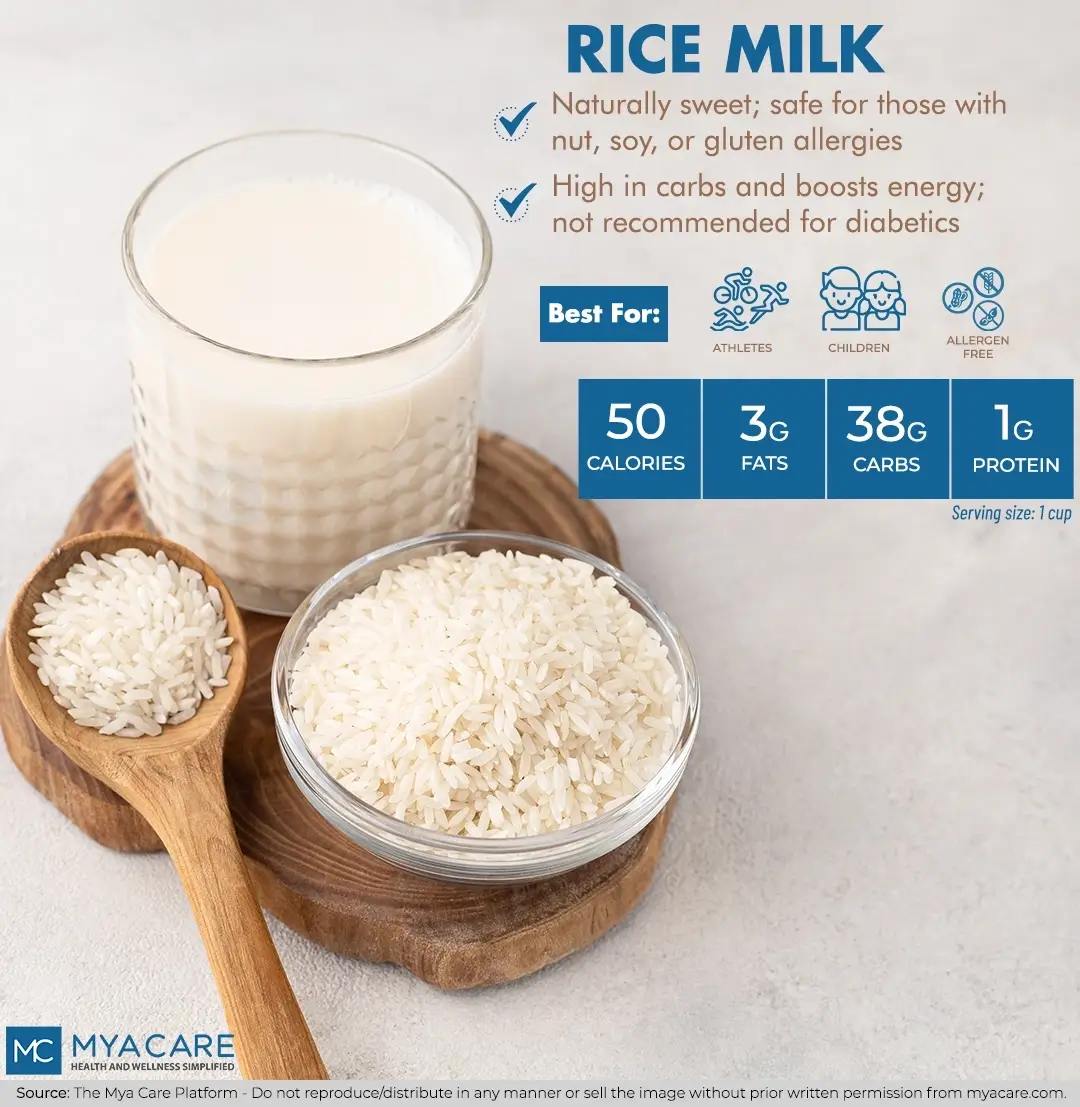
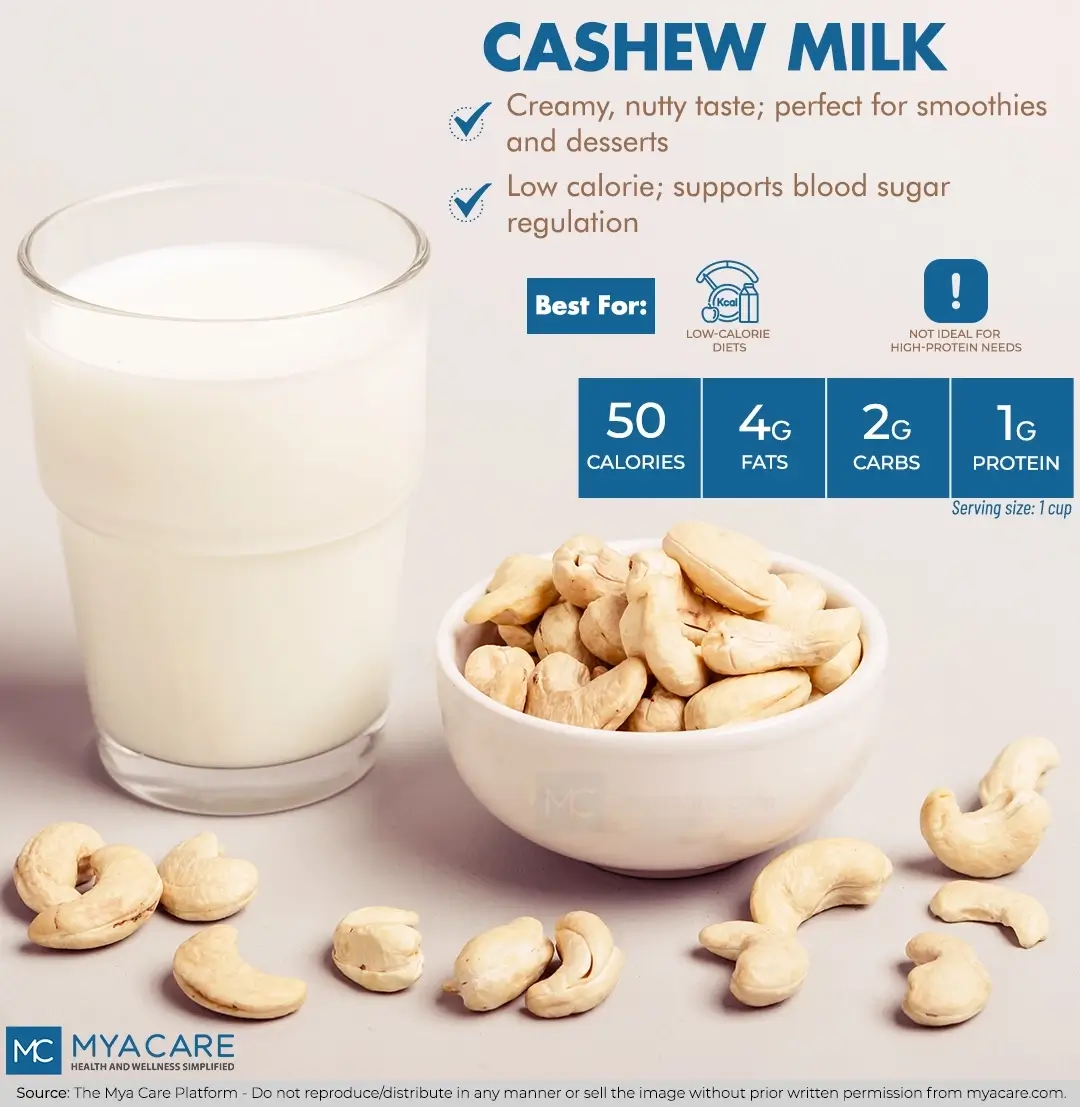
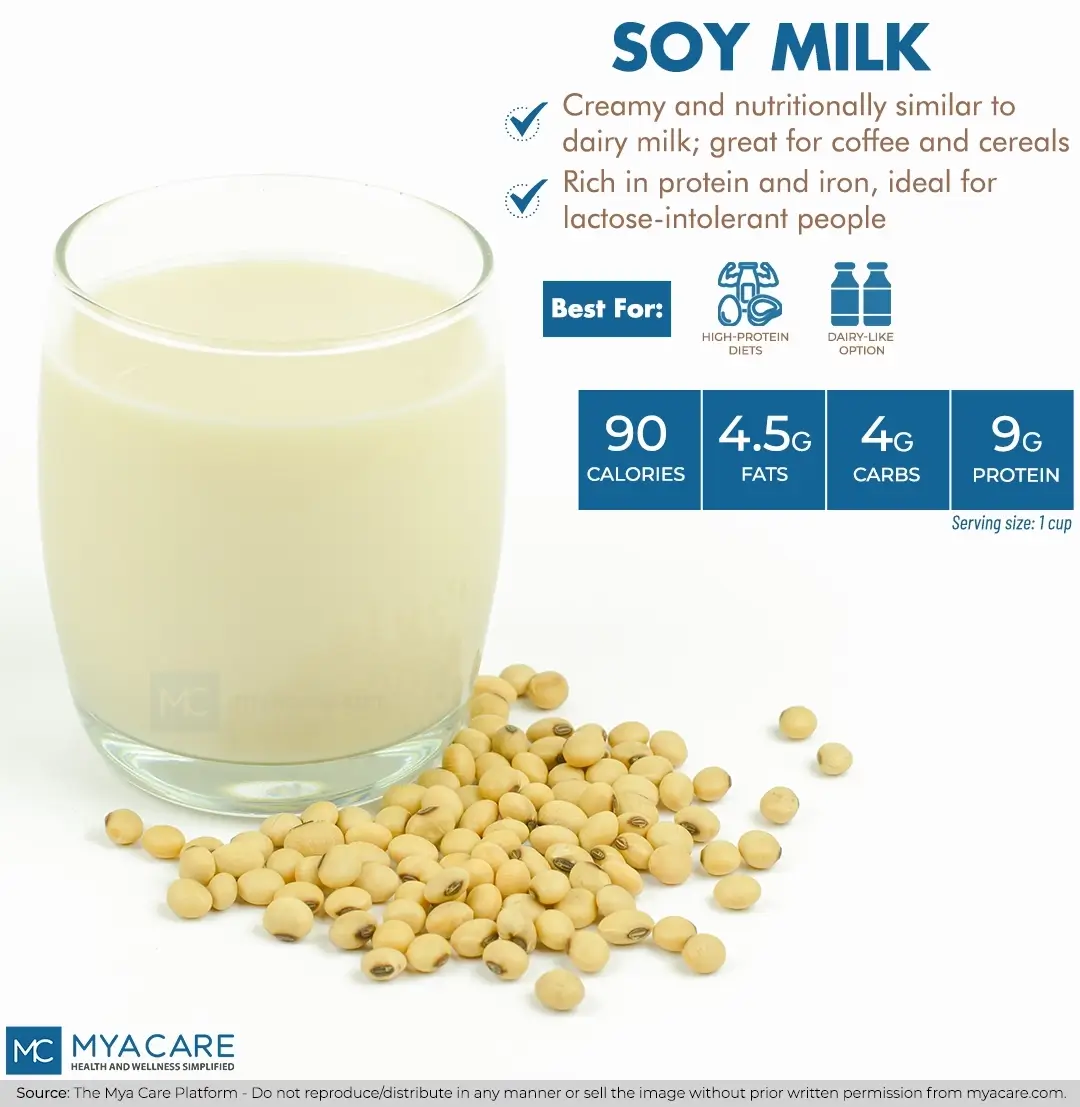
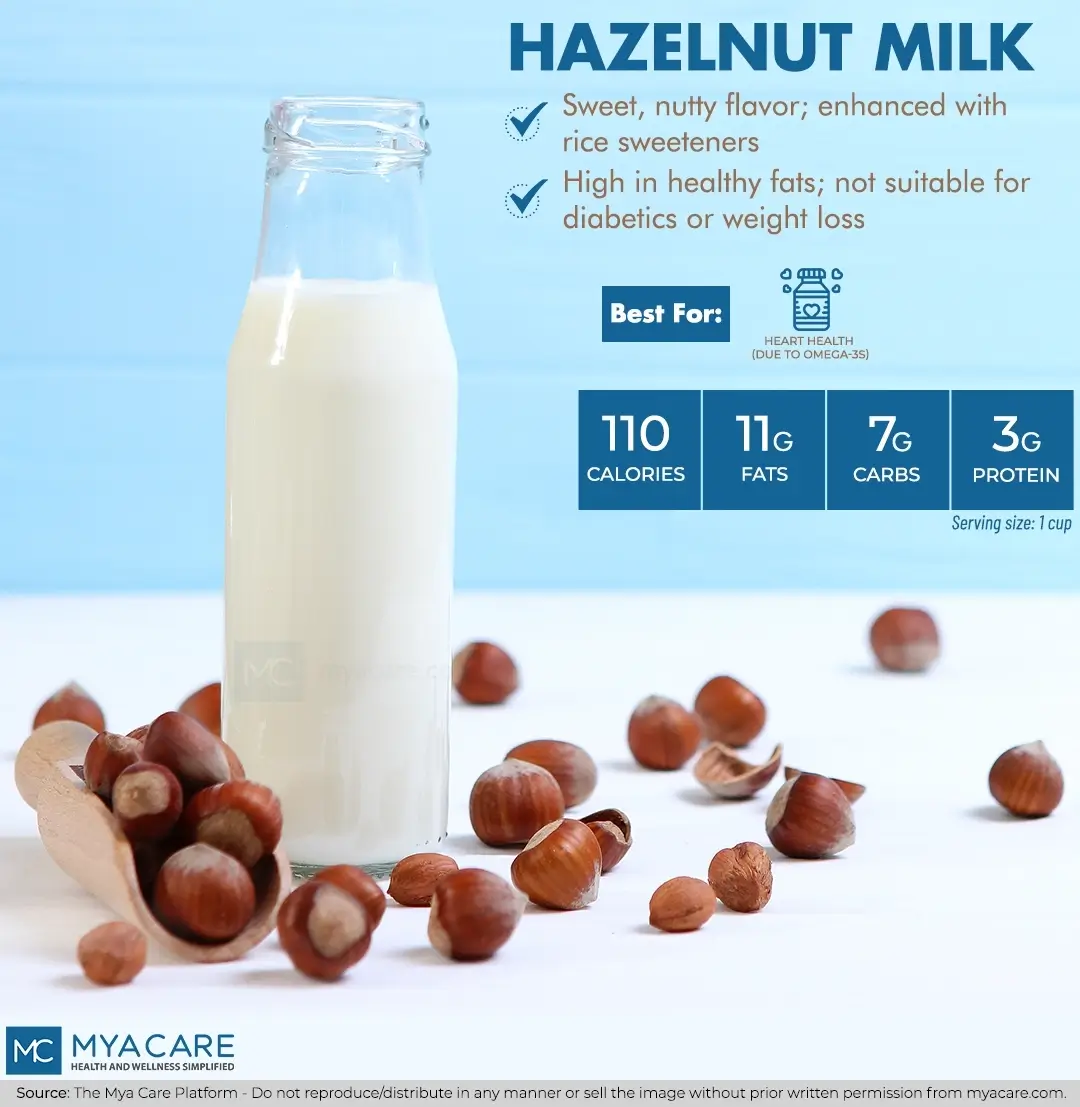
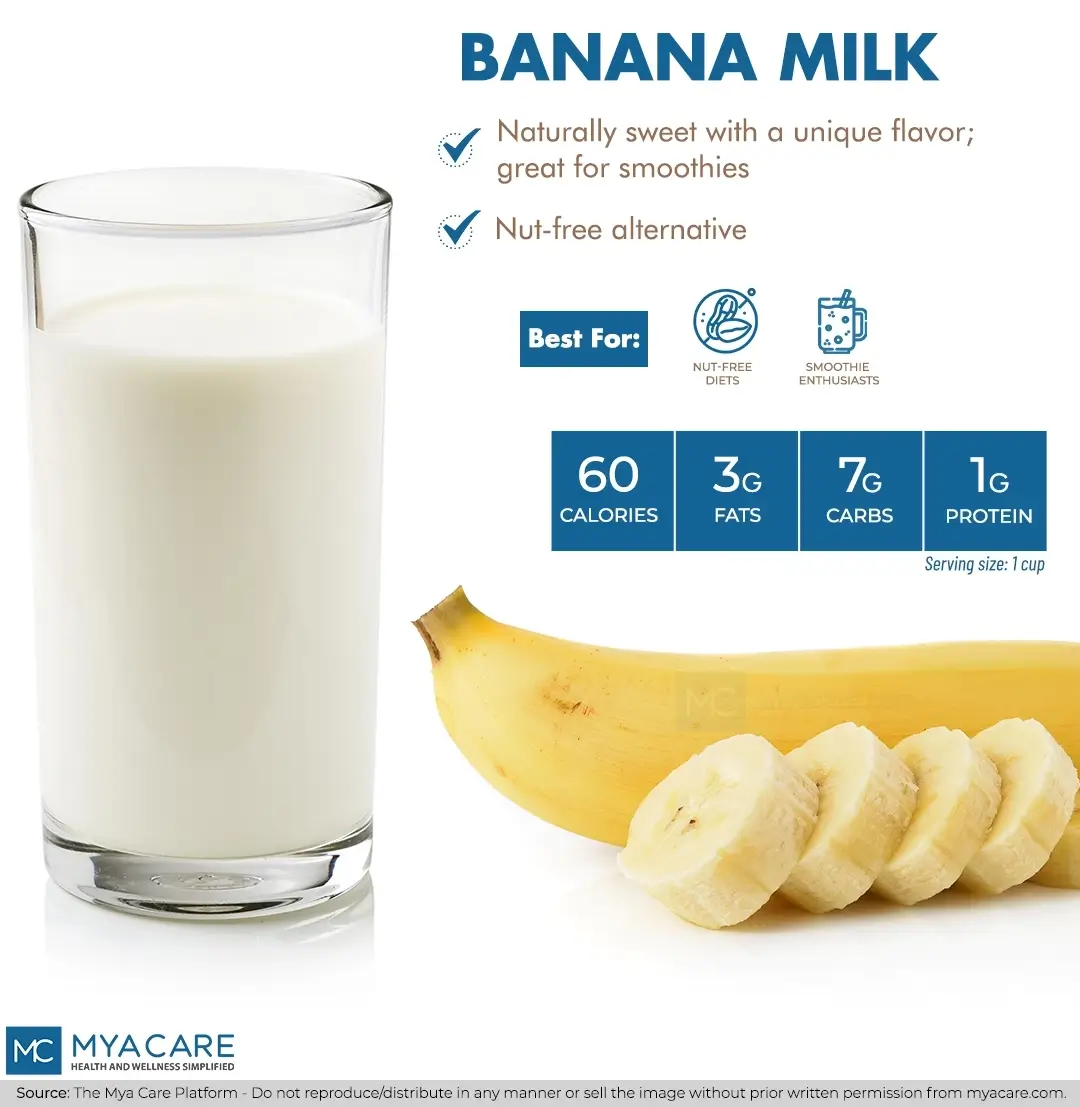
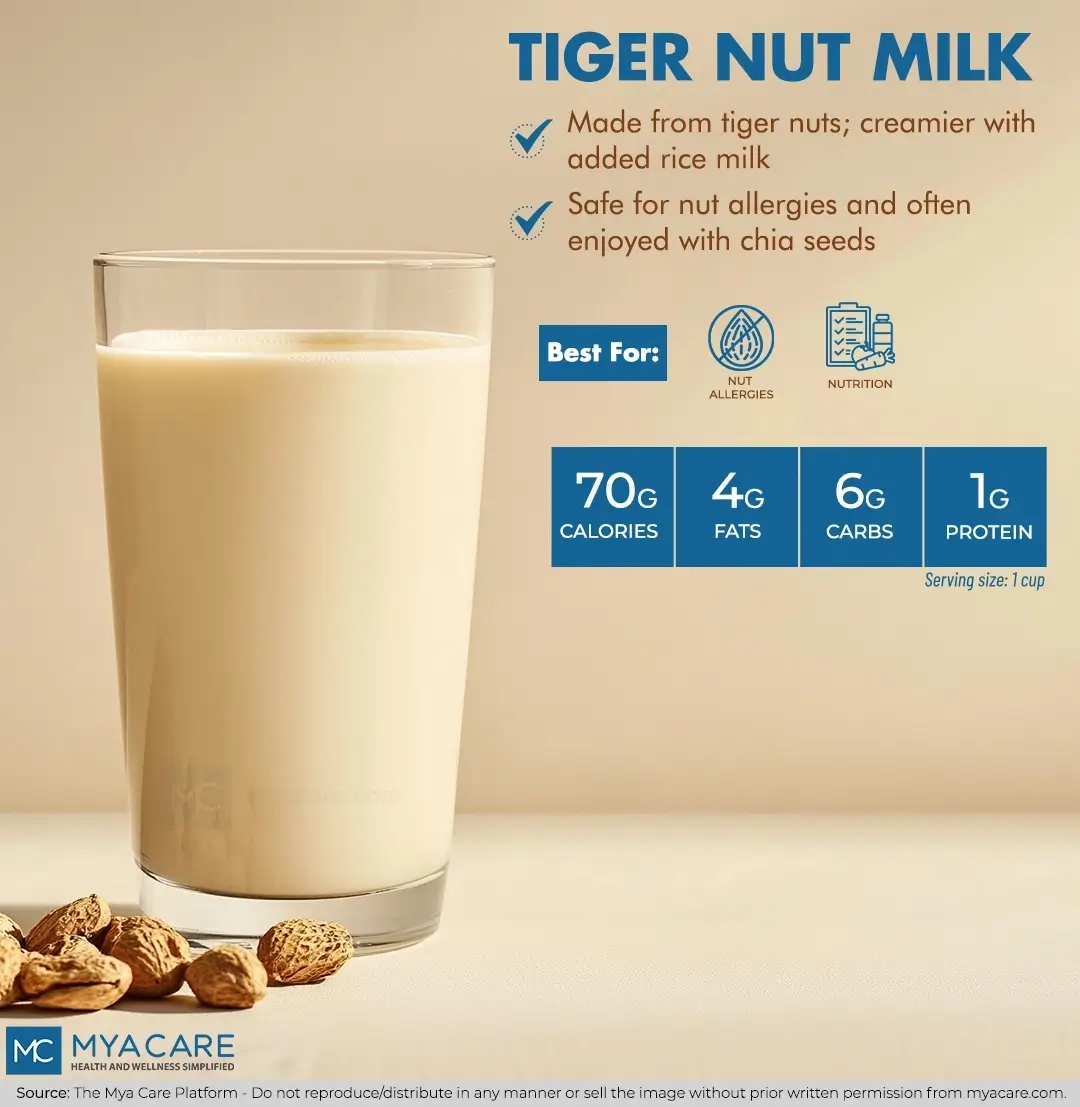
Frequently Compared Non-Dairy Milk Substitutes
Coconut Milk vs. Almond Milk
Coconut milk has way more calories and fat compared to almond milk. However, almond milk contains more dietary minerals, such as calcium, potassium, and sodium, which makes it more nutritious.
Oat Milk or Almond Milk
Both are lactose-free and quite similar. However, compared to almond milk, oat milk provides more nutrients, such as fiber and protein, while keeping you full longer. Almond milk, however, has more calcium content than oat milk.
What to Look Out for When Selecting Non-Dairy Substitutes
Choosing a particular kind of milk while grocery shopping can become overwhelming with all the different non-dairy milk alternatives available. Here are some tips and features that will help:
The Additives
To enhance the flavor of most plant-based milk, sugar, gums, oils, and other unhealthy sweeteners are usually added. So it is advisable to check the types of sweeteners added, and to be on the safer side, go for unsweetened alternatives.
Cost
Most non-dairy substitutes are more expensive than regular dairy milk, so you could go for cheaper ones as they mostly have similar nutritional profiles. You can make some of them at home as a DIY recipe, although you might miss out on some nutrients.
Calcium Content
One of the main sources of calcium that your body needs for strong bones is milk. So when going for non-dairy alternatives, check the calcium content and ensure it is at least 120 mg per 100ml. Several non-dairy milk substitutes are fortified with calcium and vitamin D, vital elements that contribute to bone health.
Allergy Warning
Most types of plant-based milk contain gluten, soy, and nuts. Hence, it is vital to keep an eye out for information about allergens on the package.
Conclusion
As discussed, good alternatives to dairy milk are available if you decide to stop consuming it. Oat, almond, soy, and coconut milk top the charts and are probably the most common non-dairy alternatives sold in grocery stores, although they can be more expensive than dairy milk. Since several brands of non-dairy milk substitutes are available, it is important to read the labels carefully to ensure that the nutritional profile and ingredients are suited to your dietary requirements and health status. Also, it is safer to stick to the unsweetened kinds, looking out for minerals like calcium specific to milk.
To search for the best Dietitian/Nutritionists in Croatia, Germany, India, Malaysia, Slovakia, Spain, Thailand, Turkey, the UAE, the UK and The USA, please use the Mya Care search engine.
To search for the best healthcare providers worldwide, please use the Mya Care search engine.
The Mya Care Editorial Team comprises medical doctors and qualified professionals with a background in healthcare, dedicated to delivering trustworthy, evidence-based health content.
Our team draws on authoritative sources, including systematic reviews published in top-tier medical journals, the latest academic and professional books by renowned experts, and official guidelines from authoritative global health organizations. This rigorous process ensures every article reflects current medical standards and is regularly updated to include the latest healthcare insights.

Dr. Rosmy Barrios is an aesthetic medicine specialist with international work experience. She earned her physician diploma at the Universidad Del Norte’s School of Medicine in Barranquilla, Colombia, and her specialty at John F. Kennedy University in Buenos Aires, Argentina. Dr. Barrios is a member of the Pan-American Aesthetic Medicine Association (PASAM) and the Union Internationale de Médecine Esthétique (UIME). She is an expert health writer with keen interests in aesthetic medicine, regenerative aesthetics, anti-aging, fitness, and nutrition. Currently, Dr. Barrios heads the Regenerative Aesthetics department at a renowned Internal Medicine clinic based in Belgrade, Serbia.
References:
Featured Blogs



